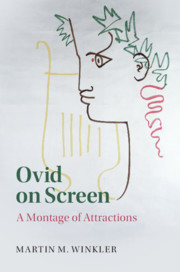Book contents
- Ovid on Screen
- Ovid on Screen
- Copyright page
- Dedication
- Contents
- Illustrations
- Acknowledgments
- D M
- Adages
- Fade-In: Prooemium
- Part I Theory and Practice
- Part II Key Moments in Ovidian Film History
- Part III Into New Bodies
- Part IV Love, Seduction, Death
- Part V Eternal Returns
- Chapter 10 Immortality: Philosophy, Cinema, Ovid
- Chapter 11 Ovidian Returns
- Sphragis: End Credits
- Bibliography
- Passages of Ovid’s Works
- General Index
- Plate Section (PDF Only)
Chapter 10 - Immortality: Philosophy, Cinema, Ovid
from Part V - Eternal Returns
Published online by Cambridge University Press: 27 January 2020
- Ovid on Screen
- Ovid on Screen
- Copyright page
- Dedication
- Contents
- Illustrations
- Acknowledgments
- D M
- Adages
- Fade-In: Prooemium
- Part I Theory and Practice
- Part II Key Moments in Ovidian Film History
- Part III Into New Bodies
- Part IV Love, Seduction, Death
- Part V Eternal Returns
- Chapter 10 Immortality: Philosophy, Cinema, Ovid
- Chapter 11 Ovidian Returns
- Sphragis: End Credits
- Bibliography
- Passages of Ovid’s Works
- General Index
- Plate Section (PDF Only)
Summary
Chapters 10 and 11 form the final part of the book. They address the concepts of artistic immortality – Ovid asserts his own at the end of the Metamorphoses – and the survival, or eternal returns, of works of art. Chapter 10 examines Ovid’s portrayal of Pythagoras, whose philosophy included reincarnation: the continuation of life after death. Pythagoras, who is often seen as Ovid’s analogue, declares: “everything changes, nothing perishes.” The same idea underlies the Italian film Four Times, one of the most emotionally involving disquisitions on nature and on the nature of life and death. Today, the cinema and related media preserve images of actors and others well beyond their natural lifespans. Screen images, we may say, are freed from time and space. Ovid’s Pythagoras had spoken of the wandering image (or appearance). Ovid, and specifically his praise of Roman ladies, is therefore rightly adduced in Roberto Rossellini’s film The Age of the Medici, one of the most beautiful films ever made on the greatness of the Italian Renaissance and, by extension, of classical and later civilization at large.
- Type
- Chapter
- Information
- Ovid on ScreenA Montage of Attractions, pp. 341 - 352Publisher: Cambridge University PressPrint publication year: 2020



